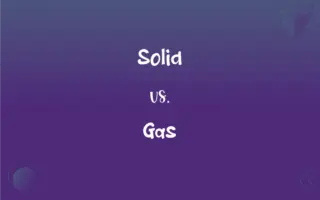Define vs. Describe: What's the Difference?
Edited by Janet White || By Harlon Moss || Updated on October 24, 2023
To define is to state the precise meaning, while to describe is to give a detailed account or picture of something.

Key Differences
When one aims to define, they provide a clear, exact explanation of a word or concept's meaning. For instance, to define the term "apple," one might say it's a fruit from the Malus domestica tree. Conversely, to describe an apple, one would mention its color, texture, taste, and other characteristics that give a vivid portrayal of it.
"Define" narrows down a term to its essential meaning, cutting away any ambiguity. For example, to define "democracy," one would state it's a system of government where citizens exercise power by voting. On the other hand, "describe" would delve into the various forms of democracies, their history, and how they function in different cultures.
When one uses "define," it's typically in the context of providing a concise, often formal explanation. Dictionaries, for instance, define words. "Describe," however, is more expansive. Authors describe scenes, emotions, or characters in their writings, painting a picture with words.
In academic or professional settings, "define" is frequently employed to ensure everyone understands a term in the same way. "Describe," in these contexts, might be used to ask someone to elaborate on a topic, giving a fuller understanding.
Comparison Chart
Purpose
State the precise meaning
Give a detailed account or picture
ADVERTISEMENT
Depth
Concise, specific
Detailed, comprehensive
Usage
Often in dictionaries, academic settings
Literature, elaborative contexts
Focus
Essential meaning
Characteristics, features
Outcome
Clarity, removal of ambiguity
Vivid portrayal, deeper understanding
Define and Describe Definitions
Define
Define means to specify distinctly.
The role of the chairman is clearly defined in the guidelines.
ADVERTISEMENT
Describe
Describe is to represent in a drawing or diagram.
The scientist described the molecular structure in a chart.
Define
Define involves setting boundaries or limits.
The river helps to define the eastern boundary of the city.
Describe
Describe means to give a detailed account.
The witness described the suspect to the police.
Define
Define means to state the exact meaning of a term.
Can you define the word 'ephemeral' for me?
Describe
Describe is to convey in words the appearance or nature of something.
She described the event in great detail.
Define
Define is to delineate the nature or basic qualities.
The constitution helps to define the rights of citizens.
Describe
Describe involves painting a picture using words.
The novelist describes the scenery so vividly that you can visualize it.
Define
Define is to represent with clarity.
The artist used sharp lines to define the contours of the face.
Describe
Describe entails providing characteristics or features.
The brochure describes the amenities of the hotel.
Define
To state the precise meaning of (a word or sense of a word, for example).
Describe
To give an account of in speech or writing
Describe a sea voyage.
FAQs
In what context is "define" most commonly used?
"Define" is commonly used in academic settings and dictionaries.
What is the main objective of "define"?
The main objective of "define" is to state the precise meaning of a term.
Does "define" always have to be brief?
Not always, but "define" aims for clarity and is usually more concise than "describe."
How does "describe" aid in understanding?
"Describe" offers a detailed portrayal, giving a fuller picture and deeper understanding.
How does "describe" typically differ in length from "define"?
"Describe" often involves a more detailed account, while "define" is usually concise.
Is "define" limited to words and terms?
No, one can also "define" boundaries, roles, shapes, etc.
Can "describe" be used in a scientific context?
Yes, one might "describe" an experiment's procedure or findings in detail.
Is "define" more objective than "describe"?
Typically, yes. "Define" aims for a clear, exact explanation, while "describe" can be more subjective.
Which word is more likely to be used in a creative context?
"Describe" is more likely, as it allows for a vivid portrayal using expansive detail.
How is "describe" typically used in literature?
In literature, "describe" paints a picture with words, detailing scenes, characters, or emotions.
Can "describe" be used in terms of graphics or visuals?
Yes, one can "describe" a scene, object, or scenario using drawings or diagrams.
What's a synonym for "describe"?
A synonym for "describe" is "depict."
How does "define" relate to clarity?
"Define" seeks to remove ambiguity, providing a clear and precise meaning.
Is "define" often a starting point in understanding a topic?
Yes, to "define" is to lay the groundwork for a deeper understanding.
Which word, "define" or "describe", is more open to interpretation?
"Describe" is more open to interpretation as it often conveys subjective perspectives or details.
Can "define" and "describe" be used interchangeably?
No, "define" gives an exact meaning, while "describe" gives a detailed portrayal.
What's a synonym for "define"?
A synonym for "define" is "specify."
Can "describe" be about feelings or emotions?
Yes, one can "describe" their feelings or the emotions a scenario evokes.
Can "describe" involve sensory information?
Absolutely, "describe" can include details related to sight, touch, taste, sound, and smell.
When might one use "define" in day-to-day conversation?
One might ask someone to "define" a word they're unfamiliar with during a conversation.
About Author
Written by
Harlon MossHarlon is a seasoned quality moderator and accomplished content writer for Difference Wiki. An alumnus of the prestigious University of California, he earned his degree in Computer Science. Leveraging his academic background, Harlon brings a meticulous and informed perspective to his work, ensuring content accuracy and excellence.
Edited by
Janet WhiteJanet White has been an esteemed writer and blogger for Difference Wiki. Holding a Master's degree in Science and Medical Journalism from the prestigious Boston University, she has consistently demonstrated her expertise and passion for her field. When she's not immersed in her work, Janet relishes her time exercising, delving into a good book, and cherishing moments with friends and family.






































































